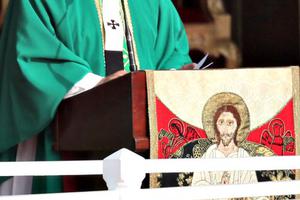Seek Service, Reject Selfishness
User’s Guide to Sunday, Sept. 23

Sunday, Sept. 23, is the 25th Sunday of Ordinary Time (Year B). Mass Readings: Wisdom 2:12, 17-20, Psalm 54:3-6, 8, James 3:16-4:3, Mark 9:30-37.
By God’s design, human beings are social rather than solitary creatures. We need to live in society with other humans, and that means we need to pay attention to our status and reputation, to make sure we have a safe and stable place in society.
Under the influence of sin, this natural need becomes distorted. It leads to envy, blind ambition and conflict — or worse, as the clerical crisis has shown. Thus St. James warns us: “Where jealousy and selfish ambition exist, there is disorder and every foul practice”; “Where do the wars and where do the conflicts among you come from? Is it not from your passions?”
When we sense that someone is getting ahead of us, there can be a sinful desire to “take him down a peg,” to reduce his status as a way of elevating our own, so that we can feel better about ourselves. The author of Wisdom shows us this thought process playing out in the minds of the wicked as they consider the righteous: “Let us beset the just one, because he is obnoxious to us; he sets himself against our doings, reproaches us for transgressions of the law.” That impulse can even lead the wicked to have murderous designs against the just one: “Let us condemn him to a shameful death; for according to his own words, God will take care of him.”
This contains a Messianic prophecy, for precisely such envy would lead the authorities to plot Jesus’ death. Thus in this week’s Gospel, we find him again predicting: “The Son of Man is to be handed over to men, and they will kill him, and three days after his death the Son of Man will rise.”
Jesus’ disciples were perplexed and too afraid to ask him to explain this. What they didn’t realize is that they were falling into the same trap as the authorities. As they walked along the road, they argued about which among them was the greatest. Jesus had offered them secure, even honored, places in God’s new society — but they weren’t content with these, and petty place-seeking began among the Twelve.
Jesus confronted them with their selfish ambition and taught them that “if anyone wishes to be first, he shall be the last of all and the servant of all.” Rather than being built on ambition and narcissism, God’s new society would be built on humility, service and love.
At points in our lives, all of us have been victims of people who want to humiliate us. All of us have been able to say, with the Psalmist, “O God, hear my prayer; hearken to the words of my mouth, for the haughty men have risen up against me.”
God knows our need to have a safe and stable place in society. He knows we need to be concerned about our reputations. But we must keep our sinful tendencies in check and not give in to pride. We must seek to serve others, and — above all — we must not seek to humiliate them just so we can think better of ourselves.
Jimmy Akin is the senior apologist at Catholic Answers,
a contributing editor to Catholic Answers Magazine
and a weekly guest on Catholic Answers Live. He blogs at NCRegister.com.

















